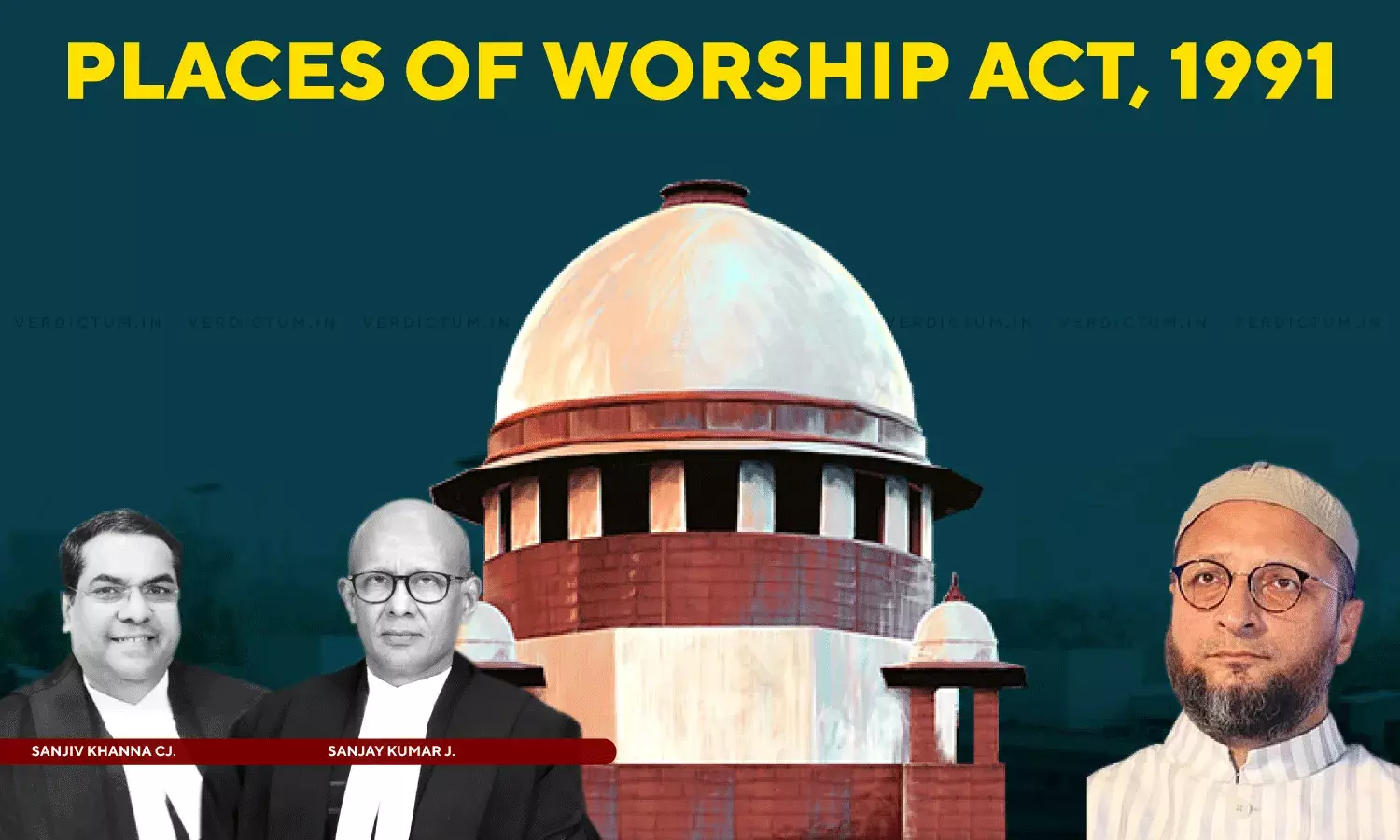Apex Court Agrees To Hear AIMIM Chief Asaduddin Owaisi’s Plea Seeking Implementation Of Places Of Worship Act

The Supreme Court today agreed to consider a plea filed by AIMIM chief Asaduddin Owaisi, seeking effective implementation of the Places of Worship (Special Provisions) Act, 1991. The Act mandates maintaining the religious character of any place of worship as it existed on August 15, 1947.
The Bench of Chief Justice Sanjiv Khanna and Justice Sanjay Kumar ordered that Owaisi’s petition be tagged with the pending cases challenging the 1991 Act.
The matter is scheduled for hearing on February 17, 2025.
During the hearing, Advocate Nizam Pasha, appearing for Owaisi, urged the Court to consider his plea alongside the existing batch of petitions related to the law. "We will tag this," remarked the Chief Justice while issuing the direction.
Owaisi’s plea, filed on December 17, 2024, through Advocate Fuzail Ahmad Ayyubi, seeks a directive for the Centre to ensure proper enforcement of the 1991 Act. The petition also highlights instances of courts ordering surveys of mosques following petitions from Hindu litigants, alleging that such actions contravene the law’s provisions.
It is to be noted that on December 18, 2024, the Apex Court while hearing batch of similar petitions against the 1991 law, restrained all courts from entertaining fresh suits and passing any interim or final orders in pending cases seeking to reclaim religious places, particularly mosques and dargahs.
"As the matter is sub-judice in this court, we deem it appropriate that no fresh suit would be registered and proceedings are undertaken till further orders of this court," the CJI-led bench had said.
As a result, the Apex Court had stalled the proceedings in about 18 lawsuits filed by various Hindu parties seeking surveys to ascertain the original religious character of 10 mosques, including Gyanvapi at Varanasi, Shahi Idgah Masjid at Mathura besides Shahi Jama Masjid at Sambhal where four persons' lives were snuffed out in clashes.
Recently, Manoj Kumar Jha, Rajya Sabha MP from the Rashtriya Janata Dal (RJD), has filed an intervention application in the Supreme Court supporting the constitutional validity of the Places of Worship (Special Provisions) Act, 1991. The intervention, filed through Advocate-on-Record Fauzia Shakil, argues that the 1991 Act aligns with the constitutional principles enshrined in the Preamble and Articles 14, 15, 25, 26, and 51A. It asserts that the Act promotes secular values and is essential for preserving communal harmony by maintaining the status quo of places of worship as they existed on August 15, 1947.
"The Act serves as a legislative guarantee to protect religious structures and reinforces the obligations of a secular State, ensuring equality among religions," the application states. It adds that the Act does not violate any fundamental rights under Part III of the Constitution and instead upholds the spirit of secularism.
Jha's plea raises concerns about the growing use of religion for political purposes and the potential threat to constitutional values posed by such practices. "Recent incidents of weaponizing religion, polarizing communities, and fostering a divisive agenda have led to a situation where dissent and diversity are increasingly under threat," it notes.
Pertinently, in July 2023, the Court had granted time till October 31 to the Centre to file its response to a batch of pleas challenging certain provisions of a 1991 law that prohibits filing a lawsuit to reclaim a place of worship or seek a change in its character from what prevailed on August 15, 1947.
On January 9, 2023, the Apex Court had asked the central government to file its reply to the PILs against some provisions of the Places of Worship (Special Provisions) Act, 1991, and had granted it time till the end of February to submit its response. The Court is seized of six petitions, including the PILs filed by lawyer Ashwini Upadhyay and former Rajya Sabha MP Swamy, against the provisions of the law.
Upadhyay has prayed that Sections 2, 3, and 4 of the Places of Worship (Special Provisions) Act, 1991, be set aside on grounds, including that these provisions take away the right of judicial remedy to reclaim a place of worship of any person or a religious group. Earlier, the apex court had observed that the pleas challenging the validity of certain provisions of the law can be referred to a five-judge Constitution bench for adjudication. While Swamy wanted the Apex court to "read down" certain provisions to enable Hindus to stake claim over the Gyanvapi Mosque in Varanasi and the Shahi Idgah Mosque in Mathura, Upadhyay claimed the entire statute was unconstitutional and no question of reading down arises.
The Jamiat Ulama-i-Hind, represented by Advocate Ejaz Maqbool, had referred to the five-judge Constitution bench judgment in the Ram Janmabhoomi-Babri Masjid title case and said the Places of Worship (Special Provisions) Act, 1991, has been referred to there and it cannot be set aside now.
The petition alleged that the 1991 law creates an "arbitrary and irrational retrospective cut-off date" of August 15, 1947, for maintaining the character of the places of worship or pilgrimage against encroachment done by "fundamentalist-barbaric invaders and law-breakers." The 1991 law prohibits conversion of any place of worship and provides for the maintenance of the religious character of any place of worship as it existed on August 15, 1947, and for matters connected therewith or incidental thereto. The law had made only one exception on the dispute pertaining to the Ram Janmabhoomi-Babri Masjid in Ayodhya.
Cause Title: Asaduddin Owaisi v. Union of India [W.P.(C) No. 846/2024; Diary No. 58411/2024]

